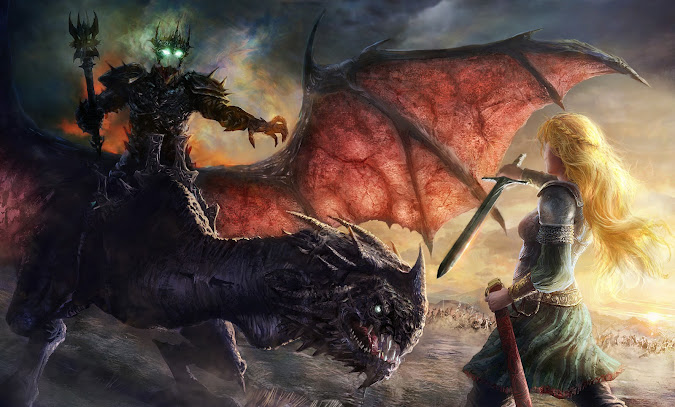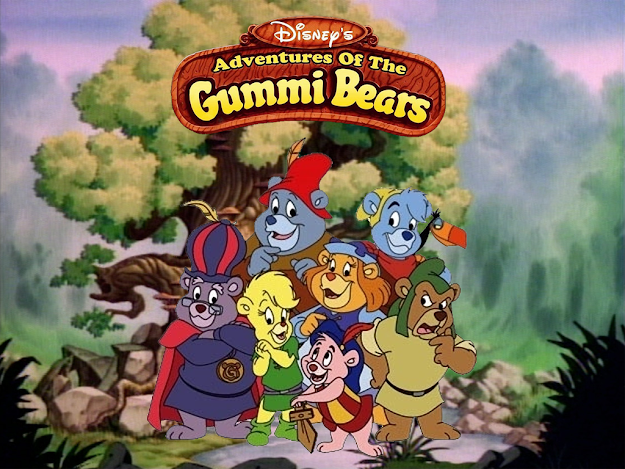Reading Advanced Dungeons & Dragons, Part 29
I'm kind of excited about this...my first NEW "reading AD&D" post in about four years.
To recap: We're through the Combat chapter of the DMG: specifically, up to page 87. That's right, folks: we're on Part 29, and only up to page 87. There's a looooooong way to go before we get through the DMG and move into the PHB.
So let's dive in, shall we?
THE CAMPAIGN
This section begins with some incredibly grandiose claims about what it takes to be an AD&D DM. It says that being a DM will "require the use of all of your skill, put a strain on your imagination, bring your creativity to the fore, test your patience, and exhaust your free time."
With such requisites for DMing in place, it's a wonder anyone ever became one! Certainly I couldn't run a game if it exhausted all my free time and used all my skill. Indeed, I suspect many of the DMs out there, be they old or new-school, don't spend every last scrap of free time working on their campaigns.
However, that's Gygax for you. Statements like these are part of what makes first edition AD&D so much fun to use. What some people like to dismiss as arrogance on Gygax's part, really I suspect is just a great deal of enthusiasm for the game. He makes some clearly hyperbolic comments because he was at the writing of the DMG just that enthusiastic about what the game was and what it represented.
Following this opening, he delivers what these days we'd consider to be the real, pure basics: the advice given is to start very small--all of the PCs are inhabitants of the same small settlement. They met in a tavern (yes, this is the direct advice in the DMG--perhaps the origin of the age-old cliche in RPGs, at least as far as RPG sources go. I'm sure there are examples in literature that pre-date it), and have decided to go explore a nearby ruin together to seek their fortunes.
This certainly cuts down on the struggle to get a party together. Just tell them what's what: you're all from the same place, and you all decided to adventure together because, why not? It's basic, it's simple, and it works.
The section goes on to discuss the importance of starting small, particularly for new DMs. It mentions that the milieu (Gygax uses this word--one of my favorite Gygaxian turns-of-phrase--many times in this section) will grow naturally as the players defeat the first dungeon and move out gradually around them. Eventually, the surrounding wilderness will be detailed, then the continent, etc...the DMG actually goes all the way out to "the makeup of your entire multiverse--space, planets and their satellites, parallel worlds, the dimensions and planes. What is there? Why? Can participants in the campaign get there? How? Will they? Never fear! By the time your campaign has grown to such a level of sophistication, you will be ready to handle the new demands."
It shouldn't go without mentioning that I've run games from first through 20+ level, even had characters ascend to godhood at the end of the game, and never had to detail my entire multiverse. Still, it serves to permeate the pages of the book with an infectious kind of excitement.
Setting Things in Motion
Next we have some words about novice DMs and novice adventurers, about using pre-packaged settings for starting campaigns. I found this interesting, as it hadn't occurred to me that this early in the game there were that many pre-prepared campaigns.At first I thought he might be referring to settings such as "I know a lot about the Hyborian Age from reading all those Ace paperbacks," but he refers directly to "one of the many modular settings that are commercially available." I can think of Tekumel and the Wilderlands. Can someone tell me: was Greyhawk out before AD&D? Were there a lot of pre-packaged campaign milieus (see? I love that word) available in '79?
In any case, the lesson to take away here is that he's talking about pre-planning. Have some idea where your campaign is going when you start. Know the world, even if you don't have it completely fleshed-out; indeed, he doesn't recommend fleshing it all out first, but rather says that as your players adventure, the world will flesh itself out.
Another item of interest: he mentions when he talks about the world coming to life that "this is not to say some occult power takes over"; since the AD&D/Satanism scare was still several years away when the DMG was published, it's an eerily prophetic statement.
Climate & Ecology
This is an interesting section, because while it gives some general guidelines about keeping things justifiable (areas with heavy rainfall should likely have a body of water nearby; make sure there are enough plants and animals to sustain any large predators you have in the area), it expressly says that while you should be careful to keep things justifiable, don't go overboard with real-world detail in why your ecology is the way it is. Keep things "balanced and justified," even if you make up some mineral or condition that doesn't exist in our world to do so. He also takes a shot at armchair biologists and physicists who will attack a DM based on an "unrealistic" ecology, saying that people this anal shouldn't be playing fantasy RPGs to begin with.
For dungeons, he says that if they are not balanced and justified, they should be completely gonzo and wildly improbable, this latter justifiable as having been put into play and maintained by some unnamed supernatural being. In other words, don't worry too much about it in the underworld.
Typical Inhabitants
This very brief section gives combat statistics and hit points for normal people, be they sedentary, active, or "laboring." Bit of an odd place to include the section, but it's a useful piece of information to have. Interestingly, in these rules, a zero-level commoner who is a serf (laborer) likely has more hit points (2-7) than your first level wizard, and possibly more than your first level thief.
Next up: SOCIAL CLASS AND RANK IN AD&D
To recap: We're through the Combat chapter of the DMG: specifically, up to page 87. That's right, folks: we're on Part 29, and only up to page 87. There's a looooooong way to go before we get through the DMG and move into the PHB.
So let's dive in, shall we?
THE CAMPAIGN
This section begins with some incredibly grandiose claims about what it takes to be an AD&D DM. It says that being a DM will "require the use of all of your skill, put a strain on your imagination, bring your creativity to the fore, test your patience, and exhaust your free time."
With such requisites for DMing in place, it's a wonder anyone ever became one! Certainly I couldn't run a game if it exhausted all my free time and used all my skill. Indeed, I suspect many of the DMs out there, be they old or new-school, don't spend every last scrap of free time working on their campaigns.
However, that's Gygax for you. Statements like these are part of what makes first edition AD&D so much fun to use. What some people like to dismiss as arrogance on Gygax's part, really I suspect is just a great deal of enthusiasm for the game. He makes some clearly hyperbolic comments because he was at the writing of the DMG just that enthusiastic about what the game was and what it represented.
Following this opening, he delivers what these days we'd consider to be the real, pure basics: the advice given is to start very small--all of the PCs are inhabitants of the same small settlement. They met in a tavern (yes, this is the direct advice in the DMG--perhaps the origin of the age-old cliche in RPGs, at least as far as RPG sources go. I'm sure there are examples in literature that pre-date it), and have decided to go explore a nearby ruin together to seek their fortunes.
This certainly cuts down on the struggle to get a party together. Just tell them what's what: you're all from the same place, and you all decided to adventure together because, why not? It's basic, it's simple, and it works.
The section goes on to discuss the importance of starting small, particularly for new DMs. It mentions that the milieu (Gygax uses this word--one of my favorite Gygaxian turns-of-phrase--many times in this section) will grow naturally as the players defeat the first dungeon and move out gradually around them. Eventually, the surrounding wilderness will be detailed, then the continent, etc...the DMG actually goes all the way out to "the makeup of your entire multiverse--space, planets and their satellites, parallel worlds, the dimensions and planes. What is there? Why? Can participants in the campaign get there? How? Will they? Never fear! By the time your campaign has grown to such a level of sophistication, you will be ready to handle the new demands."
It shouldn't go without mentioning that I've run games from first through 20+ level, even had characters ascend to godhood at the end of the game, and never had to detail my entire multiverse. Still, it serves to permeate the pages of the book with an infectious kind of excitement.
Setting Things in Motion
Next we have some words about novice DMs and novice adventurers, about using pre-packaged settings for starting campaigns. I found this interesting, as it hadn't occurred to me that this early in the game there were that many pre-prepared campaigns.At first I thought he might be referring to settings such as "I know a lot about the Hyborian Age from reading all those Ace paperbacks," but he refers directly to "one of the many modular settings that are commercially available." I can think of Tekumel and the Wilderlands. Can someone tell me: was Greyhawk out before AD&D? Were there a lot of pre-packaged campaign milieus (see? I love that word) available in '79?
In any case, the lesson to take away here is that he's talking about pre-planning. Have some idea where your campaign is going when you start. Know the world, even if you don't have it completely fleshed-out; indeed, he doesn't recommend fleshing it all out first, but rather says that as your players adventure, the world will flesh itself out.
Another item of interest: he mentions when he talks about the world coming to life that "this is not to say some occult power takes over"; since the AD&D/Satanism scare was still several years away when the DMG was published, it's an eerily prophetic statement.
Climate & Ecology
This is an interesting section, because while it gives some general guidelines about keeping things justifiable (areas with heavy rainfall should likely have a body of water nearby; make sure there are enough plants and animals to sustain any large predators you have in the area), it expressly says that while you should be careful to keep things justifiable, don't go overboard with real-world detail in why your ecology is the way it is. Keep things "balanced and justified," even if you make up some mineral or condition that doesn't exist in our world to do so. He also takes a shot at armchair biologists and physicists who will attack a DM based on an "unrealistic" ecology, saying that people this anal shouldn't be playing fantasy RPGs to begin with.
For dungeons, he says that if they are not balanced and justified, they should be completely gonzo and wildly improbable, this latter justifiable as having been put into play and maintained by some unnamed supernatural being. In other words, don't worry too much about it in the underworld.
Typical Inhabitants
This very brief section gives combat statistics and hit points for normal people, be they sedentary, active, or "laboring." Bit of an odd place to include the section, but it's a useful piece of information to have. Interestingly, in these rules, a zero-level commoner who is a serf (laborer) likely has more hit points (2-7) than your first level wizard, and possibly more than your first level thief.
Next up: SOCIAL CLASS AND RANK IN AD&D






I agree, The Campaign is probably my favorite section in the DMG, and worth rereading from time to time.
ReplyDelete